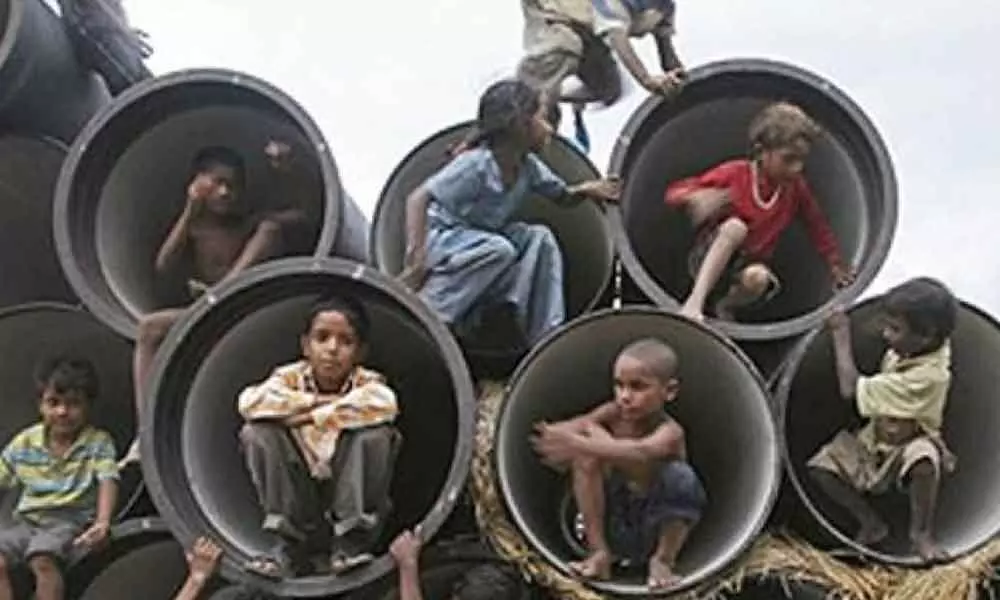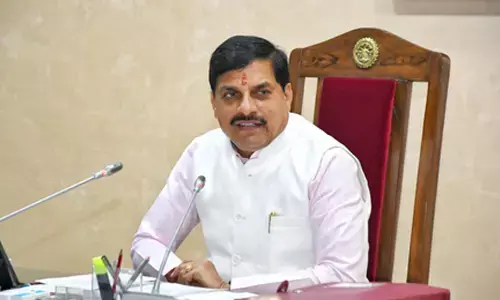Real development still eludes India

While this is the situation on the economic front, one cliché that looms large in governance and poll campaigns in India is that of caste politics
Will all the lofty slogans like Sabka Saath, Sabka Vikas, Sabka Vishwas etc remain mere slogans? Is governance both at the central level and state level slipping somewhere? Are we allowing another East India Co to grow in India as alleged by the RSS journal Panchjanya?
Will all the lofty slogans like Sabka Saath, Sabka Vikas, Sabka Vishwas etc remain mere slogans? Is governance both at the central level and state level slipping somewhere? Are we allowing another East India Co to grow in India as alleged by the RSS journal Panchjanya?
These are some of the issues which need to be pondered over and should be taken seriously. One should not brush them aside saying that the journal has RSS leanings. There is an old saying in Telugu which states that any suggestion should be examined. It does not matter whether the observation is from a nonagenarian or a small child. Similarly, a comprehensive and impartial study should be conducted into the system of governance particularly when people start expressing doubts.
E-commerce platforms like Amazon, Flipkart or the Indian versions like AJIO have become popular. There is no doubt about it. They had also come to the rescue of the consumers and sellers during the first and second wave of Corona pandemic. So far so good but then the allegation is not that.
The charges against Amazon is that it is the second generation of East India Company. The article alleged that Amazon had indulged in corrupt practices like bribery. Well corrupt practices and bribery is also not new in India. Whether it is the alleged kickbacks in Bofors gun deal or the Rafale jet purchases, such allegations had always been there.
What should cause concern is the allegation that " Amazon had floated shell companies to capture the e-market platform and of bribing to have policies in its favour, and of airing programmes opposed to Indian culture through Prime Videos", the Panchjanya says in a gist of its cover story.
The cover story said Amazon invested in India with a promise to help small traders get a larger platform to sell products, it floated its own companies to do the same. "The company floated supplier entities such as Cloudtail and Apiria in which it had significant stake and indirect control", the article said.
Though the e-commerce platforms have become very popular among the people and even to buy a mop or a broom people are clicking on these e-commerce platforms.
When India was hit by first and second wave of Corona pandemic, one had noticed many behavioural changes among people. Suddenly people became more conscious about their lifestyle like not entering houses with chappals on, washing feet and taking bath after going back home, keeping surroundings clean, and following grandma's health tips like opting for ayurvedic immunity boosters etc.
It was also felt that the wheel had taken a full turn and Indians are back to their old and healthy practices and have once again recognised the importance of Indian food and system. Yoga had become more popular. Keeping in tune with the mood of the people, Amazon had even started marketing cow dung cakes, coal, angeethi and even mango leaves online.
Till about 1980s the villages used to have the typical rural outlook. About 30 feet roads, tile roof houses, walls made of walls of lime and mud and beams made of wood from "Tadi" (date palm) trees. Floors used to be of either mud or locally available stone tiles. Every house used to have a big rainwater harvesting pit in the middle of the hall with an opening from the roof. They also used to have big wooden boxes with brass fittings which were used for storing clothes, cash and jewelry.
Villages usually used to have at least two or three water tanks of which one was exclusively meant for washer men to wash the clothes. The other two used to be for drinking water purposes and the water used to be pure.
In case of villages in coastal Andhra Pradesh, the villages also have canal running through the village. Women folk used to gather cow dung and make cakes out of them which was used for the purpose of fuel and mopping of the floor and eve repair of damaged mud walls.
In the backyard, as part of feed management of cows and buffaloes every house used to have stacks of dry grass. But over the years, in the name of developing the villages and the process of modernisation, the natural habitats have disappeared. Water tanks, water harvesting pits, cattle, dry grass stacks, thatched houses disappeared, and concrete jungles have emerged. The canals got highly polluted.
LPG has replaced cow dung cakes and villages got converted into unplanned, unhygienic places. These developments have changed the living conditions of rural areas. Now the wooden boxes, cow dung, haystacks, coal, angeethi and mango leaves have become commodities on e-platforms like Amazon.
By resorting to sale of such goods on e-commerce platforms, people have started depending on such sites even to buy mango leaves which could be the beginning of over dependency. If such a tendency grows the consequences could be serious over period. Certainly, the e-commerce platforms would go more aggressive and sell anything from cow dung cakes to modern electronic gadgets and become world's richest people and fly into orbit for fun. Rural products have become fancy items and are emerging as Kamadhenu for e-commerce platforms.
While this is the situation on the economic front, one cliché that looms large in governance and poll campaigns in India is that of caste politics. From selection of candidates to the final analysis of results, caste subsumes all other factors. Sometimes class politics is brought to the fore but it soon disappears.
We have seen this in the Bihar elections where there was a lot of talk of economic justice and the poll plank was creating jobs. But once the polls were over, it was back to caste politics.
Soon after the Telangana minister Eatala Rajender resigned, the State government came with Dalit Bandhu scheme. On the floor of the house and from public platforms all parties speak about class politics but when it comes to practicality, they fall back on caste politics. All parties vie with each other in promoting caste politics. Woo the dominant caste, shower sops on them announce new programs and ensure that votes are registered in the voting machines.
Different schemes and sops are announced more for political purposes but later they get diluted. We have seen this in many cases. For example, the two-bedroom scheme which was launched with much gusto but seven years down the lane, still the implementation is at snail's pace.
Similarly, Andhra Pradesh is riddled with many defunct welfare schemes according to some of the former chairmen of the Corporations like Brahmin Corporation. The TDP government gave importance to this community in 2014 general elections since this community was relevant in the first election after bifurcation and because TDP and BJP had poll alliance. None of these schemes listed on the website exist in Andhra Pradesh says the former chairman of this corporation IYR Krishna Rao.
Caste continues to rule politics as always. Even political strategists have been doing the same thing when they are hired by political parties. Divide the people on caste basis everywhere and get political mileage that seems is the order whether it be the panchayat elections or general elections. On one hand economically, we are allowing e-commerce platforms to indulge in corruption and bribery and occupy the economic space and on the other, the divide and rule policy is being followed to win elections and stay in power.
One thing which needs to be appreciated is the way the politicians coin slogans and explain each scheme which promises the moon but, the benefits do not commensurate with the promises. On the other hand, this policy has given rise to a different kind of inequality in the country and a new aspirational class is emerging.
All this results in fund crunch for the governments. How to deal with it? Well some States scout for loans adding to the debt burden on the genuine taxpayer while some states like Telangana have come up with a new proposal to impose indirect taxes known as 'Green Fund Tax'. Under this proposal
legislators, bureaucrats, govt officials, students and the citizens who used various government services will be taxed.
Rs 500 will be collected from MPs, MLAs and MLCs every month. The bureaucrats are will have to pay Rs 100 per month, TNGOs, NGOs Rs 25, mop up Rs 1000 crore per annum from the shops which would apply for licence, and charge the common for the certain services like renewal of vehicle registration etc. All this the government claims is for Haritha Haram project so that it can help in environmental protection which has become necessary in view of climatic changes and global warming etc.
The suspicion among the middle class that such measures cannot modernise economy but will push it into greater trouble and put unbearable burden on the common man. No government wants to forego even a part of the taxes it levies on petrol but wants to burn bigger and bigger hole in the pockets of the common man. Is this Sabka Vikas? Let's hope the political executive will ponder over this issue.




